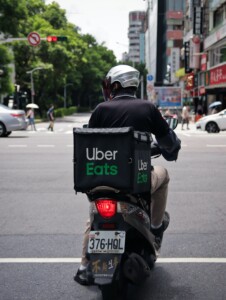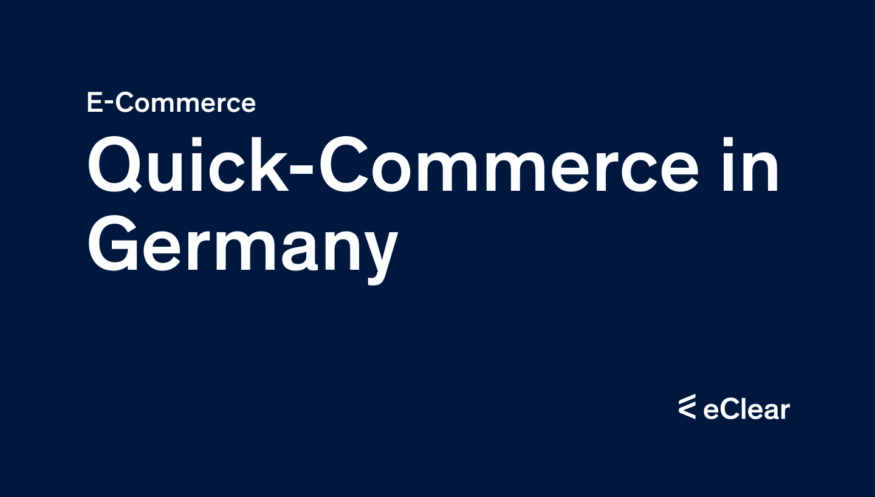In today’s world, quick delivery services like Flink and Getir have become a serious alternative to traditional grocery retailing. According to a survey by management consultants Oliver Wyman, more and more customers are turning to the so-called quick commerce providers and having their weekly groceries conveniently delivered to their homes.
However, the fierce competition within the industry shows that service providers have hardly been able to build customer loyalty so far. Customers primarily look at price and speed of delivery, and ordering apps allow them to compare these criteria in real-time before each order.
Germany has gained an edge over other European countries, such as France and the Netherlands, in quickly delivering groceries. The country is a leader in the discount segment and a quick commerce pioneer. The average shopping basket here is higher than elsewhere, with higher purchase frequency. This shows that consumers in this country are open to innovative and practical solutions in food retailing and are happy to take advantage of them.

Copyright: zhuo cheng you @ unsplash
The increasing popularity of fast delivery services is challenging traditional retail. Still, it also offers new opportunities for competition and innovation. Customers can now order groceries quickly and conveniently from home without worrying about long queues or parking spaces. Especially during the height of the pandemic, consumers once again resorted to Getir (then called “Gorillas”) or Flink.
Since the mid-2020s, fast delivery services such as those mentioned above have been advertising that consumers can grocery shop within minutes without leaving their homes. Meanwhile, the so-called quick commerce providers are increasingly succeeding in contesting the sales of stationary food retailers. According to a study, many customers already do a considerable part of their weekly shopping by ordering from a quick delivery service. Jens von Wedel, a partner at Oliver Wyman, says: “The quick commerce providers have proven surprisingly quickly that their business model can serve more than just impulse purchases. This gives them the potential to become a serious competitor to supermarkets.”
Heavy users spend up to 39% of their grocery budget on Quick Commerce
Fruit and vegetables, and dairy products are the most ordered products at Q-Commerce. Ready-made products play a subordinate role. A survey of 2,100 Q-Commerce users from Germany, France, and the Netherlands shows that almost half (47%) of German customers use the service two to four times a month. Eight per cent use the delivery service at least five times a month. Jens von Wedel says: “The number of heavy users is high.” More than a third (36 %) of users spend 20 to 39 per cent of their grocery budget on Q-Commerce.
Many customers have noticeably changed their shopping behaviour. Half (50 %) of those surveyed regularly have Flink and Co. bring them their entire weekly shopping. This is mainly at the expense of supermarkets or discounters. According to the survey, more than half (51 %) of the users would fall back on stationary retail if fast delivery services did not exist. Only 22% would switch to alternative e-commerce providers in the food segment, whose models provide longer order lead times. Experts speak of Q-commerce with a delivery time of 30 minutes or less.
Q-Commerce providers are pricier than stationary retailers
Quick delivery services are popular, but customers often don’t know they pay more for the service than in the supermarket. According to a survey, 60 per cent of respondents consider quick commerce providers to be comparably expensive or cheaper than traditional retailers. However, an analysis of typical shopping baskets indicates that the costs for providers like Flink are five to 16 per cent higher than in the supermarket. Moreover, there are delivery costs. Moritz Küntzler, Principal Retail and Consumer Goods at Oliver Wyman, says: “The lower the value of the shopping basket, the greater the impact of delivery costs.”
Nevertheless, respondents show a high tolerance for higher costs. For a shopping basket worth 20 EUR delivered within 30 minutes, 41 per cent consider a surcharge of two euros to be justified. Another 34 per cent even accept additional costs of up to five euros.
Germany has a higher propensity to buy than France and the Netherlands, with an average Q-Commerce shopping basket value of just under 31 EUR. According to Küntzler, Germany has already matured in this area. The market share of discounters is 40 per cent, and Germany is thus also a quick-commerce country. However, this does not automatically mean higher customer loyalty. For Q-Commerce users in Germany, price and speed of delivery are the most critical selection criteria. Küntzler says: “Whoever is the fastest at the time of ordering and has good offers gets the nod.” Suppliers must continue to optimise their cost drivers to compete.
Profitability is more important than reach in quick commerce
Experts estimate the total market for quick commerce in 2022 in Germany at EUR 500 to 700 million – less than one per cent of the total turnover in the food sector. About 0.8 to 1 million users use the delivery services. “The economic viability of the model remains a challenge,” says Jens von Wedel. “No provider has yet achieved nationwide profitability.” However, Flink has promised to be in the black by the end of 2023. Von Wedel sees one hurdle to profitability in the labour-intensive assembly of goods and the high efficiency required for delivery. “This efficiency seems achievable mainly in high-density inner-city areas,” says von Wedel. “The reach of the model will thus be limited to a part of the population for the foreseeable future.” In rural areas, there is no economic concept for Quick Commerce. “This will not change for now – the focus of the providers is to turn it around.”

Copyright: luca campioni @ Unsplash
Given the high intensity of competition, the consolidation of the Q-Commerce market continues. The Turkish Getir has meanwhile taken over the Berlin start-up Gorillas. “A duel with Flink is emerging,” says von Wedel. Food retailer Rewe also took a stake in the Berlin-based company in June 2021. “This shows how seriously they take the competition from fast delivery services,” says von Wedel. The growth opportunities go beyond the pure grocery trade: 78 per cent of those surveyed see Q-Commerce as an essential channel in the non-food sector in the future.
According to Thorsten de Boer, Partner at Roland Berger, Quick Commerce is not simply an increase in the level of service with even faster delivery times, but an entirely new channel with a unique business model. Quick Commerce is aimed primarily at consumers who want to make spontaneous, time-critical, or emotional purchases. The business model focuses on fast-moving consumer goods with high margins. De Boer emphasises that Quick Commerce will not replace classic online commerce, but complement and even boost it.




